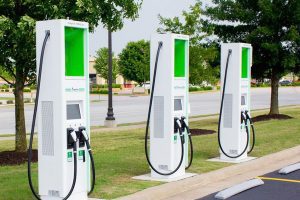
The proposed project is the most significant EV charging initiative undertaken by Hawaiian Electric. It builds on the company’s experience from providing public fast charging for more than seven years under a pilot program approved by the PUC. In that time, the EV market in Hawaii has grown markedly, creating a need for more charging stations to meet demand. And every major global vehicle manufacturer, including Ford, General Motors, Volkswagen and Jaguar, has announced plans to transition a large share of their products to electric over the next decade.
If approved by the PUC, Hawaiian Electric would look to install and operate approximately 150 single-port DC fast charging stations and 150 dual-port Level 2 charging stations at roughly 75 sites across the company’s service territory from 2023 through 2030. About 60% of the sites would be on Oahu, 20% in Maui County and 20% on Hawaii Island. This aims to serve about 28 percent of total public fast charging need in 2030 to catalyze third party market participation while also serving a critical backbone of reliable charging for our community.
Hawaiian Electric also proposed a revised EV charging tariff designed to be roughly cost-competitive with gasoline and continue to encourage charging during the middle of the day when solar energy is abundant. The proposed rates are 20% to 46% below the existing pilot rates, depending on the island and time of day the charging is done.
“Providing drivers with expanded public charging options is critical to serving more electric vehicles on Hawaii’s roadways,” said Aki Marceau, Hawaiian Electric’s director of electrification of transportation. “Hawaiian Electric is committed to taking action on climate change by helping to decarbonize Hawaii’s economy, and electrifying ground transportation is a major part of that effort.”
The estimated cost of the project is $79 million, which includes installation and maintenance of the charging stations. Hawaiian Electric would recover the cost of the project from customers over the seven-year life of the project.
As EV adoption grows, the resulting increase in electricity sales revenue will not result in increased profits for Hawaiian Electric but will contribute to the recovery of the utility’s fixed costs and, over time, put downward pressure on electricity rates for all customers.
Hawaiian Electric actively seeks input from the public to inform its electrification of transportation planning. Most recently, the company received robust community feedback through the Charge Up Hawaii interactive webtool, which asked customers about their mobility needs and where they think EV charging stations are needed. Hawaiian Electric received 2,045 survey responses and recorded 1,812 pins suggesting future charging sites. The results will be weighed against other considerations to help guide charging station placement.
The number of electric passenger vehicles in Hawaii has steadily increased, with more than 16,000 registered statewide today. Hawaiian Electric estimates that in 2030 more than 3,600 public charging stations will be needed at workplaces, shopping centers, parks and multi-unit dwellings so that future EV users have dependable charging solutions.
Initiatives such as the proposed Public Electric Vehicle Charger Expansion Project are a way Hawaiian Electric can help fill a market gap in EV charging — a gap that has widened as more EVs hit the road. Besides the utility, so far there has been very little investment by others in public fast charging infrastructure. National and local surveys cite a lack of reliable and geographically complete network of public charging – especially convenient fast charging – as a significant barrier to EV adoption.